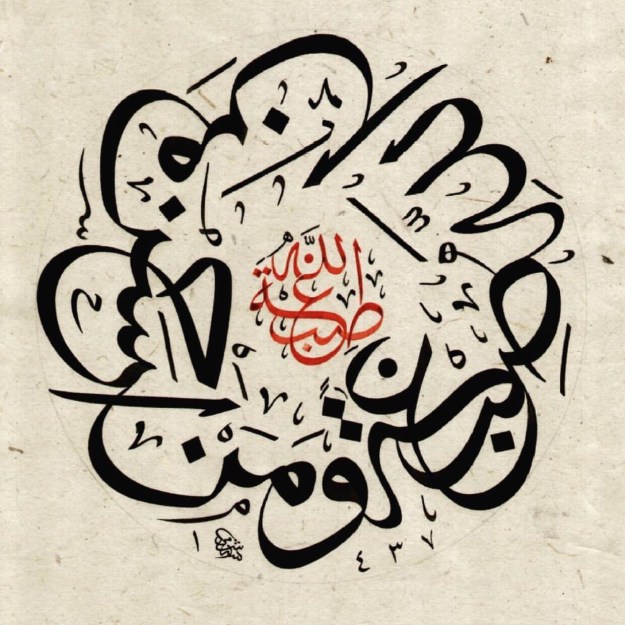
رَبَّنَا لَا تُزِغْ قُلُوبَنَا بَعْدَ إِذْ هَدَيْتَنَا وَهَبْ لَنَا مِن لَّدُنكَ رَحْمَةً ۚ إِنَّكَ أَنتَ الْوَهَّابُ
“Our Lord, do not let our hearts deviate from the right path after You have given us guidance, and bestow upon us mercy from Your own. Surely, You, and You alone, are the One who bestows in abundance.”
Sayyidi wa sanadi Mufti Mohammed Taqi Usmani (Allah protect & preserve him) explained, among other things:
“This deviation is of two kinds:
1) Deviation in understanding of Deen
As an example, he narrated the following incident:
Once I was in America. A talk used to be conducted after Fajr prayer where people travelling from hundreds of miles away also used to attend. People asked me regarding the matter of Istiwa ‘alal ‘Arsh (Allah’s ascending/sitting on His throne), i.e. is it literal ascending/sitting or figurative. I asked them: “What gave rise to this question in your minds?” They explained that a scholar from Saudi Arabia visits us to give religious talks. He tells us that “‘Aqeedah must be corrected first. And ‘aqeedah will not be correct until and unless you believe that when Allah tells us that he sat on His throne then it is a literal sitting. You will not be a Muslim until and unless you have this belief.”
The state of the people there was that they did not know the rulings of prayer; they were not aware of several matters related to what is Halal (permissible) and what is Haram (impermissible); they were not aware of the rulings of Nikah (marriage) and Talaq (divorce); they were not aware of Islamic etiquettes and the Sunnah (Prophetic) way of doing things. While the people were lacking in knowledge of all these important matters, they were plunged them into the matter of Istiwa ‘alal Arsh.
I told them to let me meet him the next time he visited. We met after Fajr one day. I sincerely asked him: “You have stirred up the matter of Istiwa ‘alal Arsh among these people while they don’t know how to pray correctly; they are not aware about the Sunnah (Prophet) way of doing things; they are not aware about the rulings of Nikah (marriage) and Talaq(divorce); they are lacking in knowledge of Halal(permissible) and what is Haram (impermissible). Is the matter that whether Allah is sitting on His throne literally or figuratively the most important knowledge for these people?
He said this matter is part of ‘aqeedah (beliefs) and ‘aqeedah(beliefs) are more important than actions. I asked him, is this such a belief about which you will be questioned in the grave? Or on the Day of Judgment? Hearing this, he became lost for words. I told him that beliefs are of two types; one type is of those without believing in which a person cannot attain salvation in the Hereafter; another type is of those on which a person’s salvation is not dependent. What unnecessary disputes are you plunging the people into!? After explaining this to him for some time, Alhamdulillah Allah Ta’ala made him understand the point. I asked him to teach people the straight-forward practical teachings of Deen, and that if the same topic is discussed further, people will divide into groups and sects and a Fitna (dispute) will be raised up.
One means of this intellectual deviation is that one attends discourses of all and sundry; one may see that a large crowd attends the lectures of so and so, and begin attending those lectures. This mode of action has the risk that if one begins liking these lectures, e.g. due to the style of the speaker, or his beautiful language, or he mentions certain points which seem attractive, or one is entertained by the lecture, or due to the large crowd attending, then one may begin absorbing all that he says without being able to objectively judge (due to one’s lack of knowledge) whether the lectures contain something which is incorrect.
Rather one should search for a reliable source of knowledge which one trusts and which scholars trust, and they have also spent time in the company of Ahlullah, then stick to it. Our elders say یک در گیر و محکم گیر (Hold on to one door, and hold fast to it). This important principal is known as Tawheed-e-Matlab in the terminology of Tasawwuf.
Sayyidi further explained that becoming famous among the masses is not a sign of being correct and being accepted in the court of Allah. Rather, becoming famous and respected among those having knowledge and understanding of Deen, and then becoming famous among the masses is one of the signs of being correct and being accepted in the court of Allah.
2) Deviation in actions
As a treatment for this, my Shaykh Dr Abdul Hayy Arifi (May Allah’s mercy be upon him) used to say:
“Imagine it is the Day of Judgment. Your deeds are being presented to you. Allah asks you: “Why did you do this when I prohibited you from it? Why didn’t you do that when I commanded you to do it?” Imagine you reply: “Oh Allah! I was weak. I was brought up in an unreligious atmosphere. The environment around me encouraged me towards your disobedience. My nafs and Shaytan overpowered me. My friends and family also spurred me towards your disobedience.”
Now imagine Allah asks you: “Why didn’t you tell me? When I repeatedly told you in the Quran that “Allah is powerful over everything”, did you think I was powerless to help you?”
What reply can you give to Allah? ”
“Do this now while you are alive. Tell Allah all your difficulties and fears in terms of falling into His disobedience and ask His protection. Once you have taken all practical measures to obey Him and avoid His disobedience, and have told Him about your fears and asked Him for protection, then you have done your job.”
Intekhab e Kaiseri
Ramadan 1440, post zohar majlis, MasjidDarulUloomKarachi













